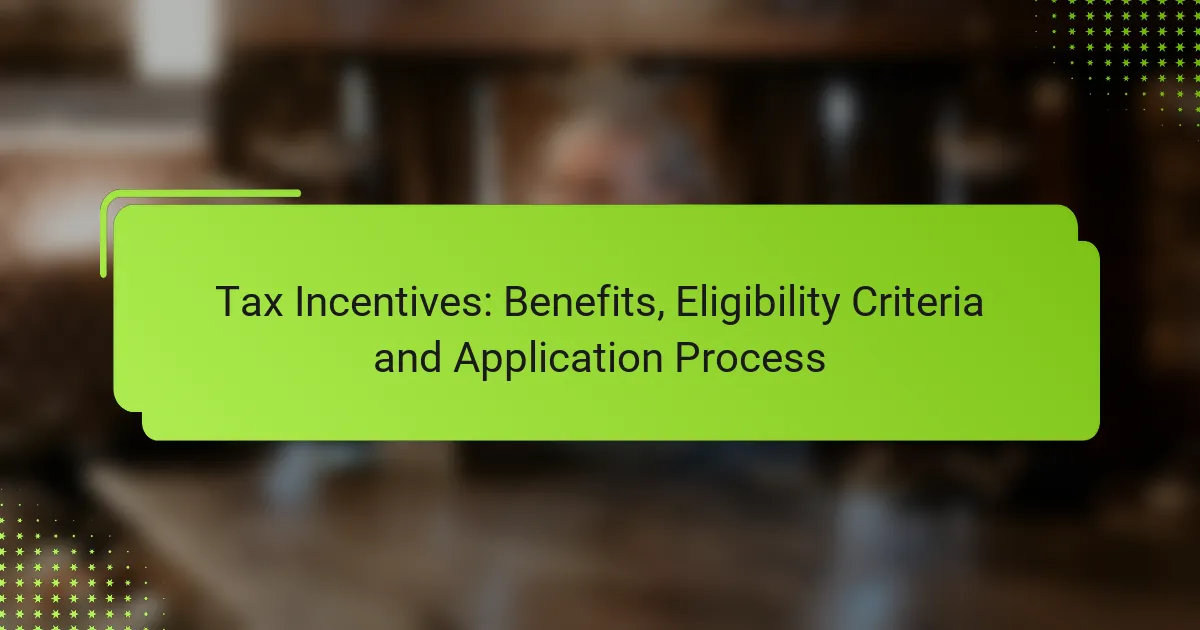Tax incentives in the United States are designed to promote investment, job creation, and innovation by reducing tax liabilities for eligible individuals and businesses. These incentives can lead to significant financial benefits, stimulating economic growth and fostering a more vibrant marketplace. Understanding the specific eligibility criteria and application processes is crucial for maximizing potential savings and leveraging these opportunities effectively.

What are the tax incentives available in the United States?
The United States offers various tax incentives designed to encourage investment, job creation, and innovation. These incentives can significantly reduce tax liabilities for individuals and businesses, depending on eligibility and specific criteria.
Federal tax credits
Federal tax credits directly reduce the amount of tax owed to the government, making them highly beneficial. Common examples include the Earned Income Tax Credit (EITC) and the Child Tax Credit, which can provide substantial savings for qualifying taxpayers.
To qualify for federal tax credits, individuals and businesses must meet specific income thresholds and other criteria. It’s essential to review the IRS guidelines or consult a tax professional to ensure eligibility and maximize benefits.
State-specific deductions
Many states offer their own tax deductions that can lower taxable income, varying widely by state. These deductions may include those for mortgage interest, property taxes, or education expenses.
Taxpayers should check their state’s tax authority website for specific deductions available and the eligibility requirements. Understanding these can lead to significant savings, especially for homeowners and families with children.
Investment tax credits
Investment tax credits (ITCs) incentivize businesses to invest in certain types of property, such as renewable energy systems. These credits allow businesses to deduct a percentage of the investment cost from their federal tax liability.
For example, the ITC for solar energy systems can be as high as 26% of the investment cost. Businesses should evaluate the potential return on investment and consult tax professionals to navigate the application process effectively.
Employment tax incentives
Employment tax incentives encourage businesses to hire specific groups of individuals, such as veterans or long-term unemployed. The Work Opportunity Tax Credit (WOTC) is a notable example, providing tax credits for hiring eligible employees.
Employers can benefit from these incentives by reducing their tax liabilities while contributing to workforce development. It’s crucial to maintain proper documentation and follow application procedures to claim these credits successfully.
Research and development tax credits
Research and development (R&D) tax credits reward companies for investing in innovation and technological advancements. These credits can cover a portion of R&D expenses, including wages, supplies, and contract research costs.
Businesses engaged in qualifying R&D activities should track their expenses meticulously and consult with tax advisors to maximize their claims. Many states also offer additional R&D incentives, further enhancing potential savings.

What are the benefits of tax incentives?
Tax incentives provide significant advantages by lowering the overall tax burden for individuals and businesses. These benefits can stimulate economic growth, encourage investment, and foster job creation.
Reduced tax liability
One of the primary benefits of tax incentives is the reduction in tax liability, which allows individuals and businesses to retain more of their earnings. This can lead to increased disposable income for consumers and more capital for businesses to reinvest.
For example, small businesses may qualify for deductions or credits that significantly lower their taxable income, potentially saving thousands of dollars annually. It’s essential to understand the specific tax laws and regulations in your country to maximize these benefits.
Encouragement of business investment
Tax incentives encourage businesses to invest in growth and expansion by offering financial benefits such as credits for capital expenditures. This can lead to improved infrastructure, technology upgrades, and increased production capacity.
For instance, a company investing in renewable energy technologies may receive tax credits that offset a portion of their investment costs. This not only enhances the company’s bottom line but also contributes to broader economic development.
Job creation and retention
Tax incentives can lead to job creation and retention by providing businesses with the financial means to hire new employees or maintain their current workforce. Programs that offer tax breaks for hiring in certain areas can be particularly effective in stimulating local economies.
For example, a business that expands its operations in a designated economic zone may receive tax incentives that help cover the costs of new hires, resulting in a stronger job market in that region.
Support for innovation
Tax incentives often support innovation by providing funding for research and development (R&D) activities. Companies can benefit from tax credits that encourage them to invest in new technologies and processes, fostering a culture of innovation.
For instance, businesses engaged in developing new pharmaceuticals may qualify for R&D tax credits, which can significantly reduce their tax burden while promoting advancements in healthcare. Understanding the eligibility criteria for these incentives is crucial for companies looking to innovate effectively.

Who is eligible for tax incentives?
Eligibility for tax incentives typically includes small businesses, non-profit organizations, startups, and investors in specific sectors. Each category has distinct criteria and benefits, making it essential to understand the requirements to maximize potential savings.
Small businesses
Small businesses often qualify for various tax incentives aimed at fostering growth and sustainability. These may include deductions for operational expenses, credits for hiring employees, and exemptions for certain types of income. To be eligible, businesses usually need to meet specific revenue thresholds, often defined by local regulations.
For example, in the United States, a business may qualify as small if it has fewer than 500 employees, but this number can vary by industry. Owners should keep detailed records of their expenses and consult local tax authorities to ensure compliance and maximize available benefits.
Non-profit organizations
Non-profit organizations can access tax incentives that support their charitable missions. These incentives often include exemptions from federal income tax and eligibility for grants that can provide additional funding. To qualify, organizations typically must be registered as 501(c)(3) entities or meet similar criteria in their respective countries.
Non-profits should maintain transparency in their financial practices and ensure they adhere to regulations governing charitable activities. Engaging with a tax professional familiar with non-profit laws can help navigate the complexities of eligibility and compliance.
Startups
Startups may benefit from tax incentives designed to encourage innovation and investment in new businesses. These incentives can include credits for research and development expenses, as well as deductions for startup costs. Eligibility often depends on the business’s age, revenue, and the nature of its operations.
For instance, in the European Union, startups may qualify for reduced tax rates or grants if they focus on technology or sustainability. Entrepreneurs should explore local startup incubators or government programs that provide guidance on available incentives and application processes.
Investors in specific sectors
Investors targeting specific sectors, such as renewable energy or technology, may be eligible for tax incentives that encourage investment in these areas. These incentives can take the form of tax credits, deductions, or accelerated depreciation on investments. Eligibility criteria often depend on the type of investment and the sector’s strategic importance to the economy.
For example, in the United States, investors in solar energy projects may receive significant tax credits. It is advisable for investors to conduct thorough research on sector-specific incentives and consult financial advisors to optimize their investment strategies while taking advantage of available tax benefits.

How can businesses apply for tax incentives?
Businesses can apply for tax incentives by completing specific application forms and providing necessary documentation to relevant authorities. The process typically involves understanding eligibility criteria, gathering required materials, and adhering to submission deadlines.
Application forms and documentation
To apply for tax incentives, businesses must fill out designated application forms, which can often be found on state or federal agency websites. Required documentation may include financial statements, tax returns, and proof of eligibility, such as business licenses or employment records.
It’s crucial to ensure that all forms are completed accurately and submitted with the necessary supporting documents to avoid delays. Some agencies may offer checklists to help applicants gather the required information efficiently.
Deadlines for submission
Each tax incentive program has specific deadlines for application submissions, which can vary by state or federal agency. Generally, businesses should prepare to submit their applications well in advance of the deadline to allow for any unexpected issues.
Missing a deadline can result in forfeiting the opportunity for tax incentives, so it’s advisable to keep a calendar of important dates and set reminders for submission. Some programs may allow for extensions, but this is not guaranteed.
Consulting with tax professionals
Engaging with tax professionals can significantly enhance the application process for tax incentives. These experts can provide guidance on eligibility, help complete forms accurately, and identify the most beneficial incentives for a business’s specific situation.
Tax professionals can also assist in navigating complex regulations and ensuring compliance with all requirements, potentially saving businesses time and money in the long run.
State and federal agency processes
The application process for tax incentives typically involves both state and federal agencies, each with its own procedures. Businesses should familiarize themselves with the specific requirements of the agencies relevant to their industry and location.
After submission, agencies may take several weeks to review applications, during which they may request additional information. Understanding the processes of these agencies can help businesses prepare for any follow-up inquiries and expedite the approval process.

What are the prerequisites for applying?
To apply for tax incentives, businesses must meet specific prerequisites that typically include proper registration and compliance with local regulations. Understanding these requirements is essential for a successful application process.
Business registration requirements
Businesses must be officially registered in their respective jurisdictions to qualify for tax incentives. This registration often involves obtaining a business license and registering for tax identification numbers, which can vary by country and region.
For example, in the United States, a business may need to register with both state and federal authorities, while in the European Union, compliance with local business registration laws is crucial. Ensure that all documentation is current and accurately reflects the business structure.
Compliance with local regulations
Compliance with local regulations is a critical factor in the eligibility for tax incentives. This includes adhering to zoning laws, environmental regulations, and any industry-specific standards that may apply.
Failing to comply with these regulations can lead to disqualification from tax incentives. It’s advisable to conduct regular audits and maintain up-to-date knowledge of local laws to ensure ongoing compliance. Consulting with a legal expert can help navigate complex regulatory landscapes.



